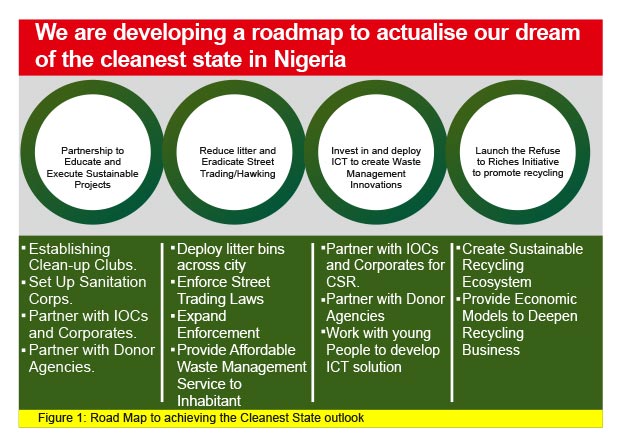When the Government of Akwa Ibom is seen committing so much of its time and resources on clean environment, it is not just focusing on safety or comfort, all of which are extremely important; It is also thinking of trade, attracting national and at international investors to buffer industrialization, boost business opportunities and encourage small scale enterprises. That was squarely the vision stake at the time Governor Emmanuel reconstituted the Agency in 2018 with Dr. Prince Ikim on the saddle. But it is one thing for a visionary to envisage and another for a visionary subject to transmute the vision into tangible reality. One can say that the overall improvement in the environment sector in Akwa Ibom is an outgrowth from Dr. Ikim’s grit of commitment to his saddled task – the management of Akwa Ibom environment – and the commitment to the realization of the vision which his saddle entailed.

Through the Agency’s operational model, in five years, Akwa Ibom State has emerged the Cleanest State for 2018, 2019, 2020, 2021 and 2022, back-to- back (CUN State of the Nation Report, 2022). This achievement is a rare feat for the state since its creation in 1987. And it is hitherto attributable to the effort the agency has conceived and implemented vigorously. In its first four years of stewardship,
AKSEPWMA achieved a spot as a wonder-working Agency with the potency of turning mud into gold. The environmental sector which before now , was deadened, abandoned, excluded and unproductive, has now flourished and blossomed. This has happened only in four years of Governor Emmanuel’ stewardship and the following achievements have been recorded.
In preserving a tradition of cleanliness and excellence in stewardship, Akwa Ibom of today, under the leadership of Udom Emmanuel and stewardship of Dr. Prince Ikim is emerging as one of the most innovative stories in post-colonial Nigeria.
THE ACHIEVEMENTS IN FIVE YEARS
CREATION OF A NEW ROAD MAP
At the time Governor Emmanuel reconstituted the Agency, there was nothing on ground for the agency to start with. ‘‘We succeeded to inherit a bald blueprint’’. The Board Chairman once posited that ‘‘AKSEPWMA had to bend over backwards to get things working at the pace it is’’, and that pace is one that matches globally- attuned standards. And the result is a huge triumph over hurdles.

The first port of call was to create a new Road Map to greatness. First, given the dearth of working tools, AKSEPWMA went to work by hiring equipment. Few weeks afterwards, it began to acquire the necessary equipment where over 40% of needed Equipment, including tractors, We are developing a roadmap to actualise our dream of the cleanest state in Nigeria.
Governor Emmanuel flagged off programs that were in sync with global best practices in September 2018. By December that year, Akwa Ibom State emerged the Cleanest State in the country.
The year following, that is 2019, the agency had not only increased her public image from 5% to 65%, but had emerged the cleanest State in Nigeria. That was when the words of L. Gant came into the picture, that “He who can see the invisible, can do the impossible”.
WASTE TO WEALTH INITIATIVE
AKSEPWMA integrated workable schemes to maximize the waste-based revenues in the form of energy, fuels, heat, recyclables, value-added products and chemicals along with more jobs and business opportunities.
To achieve this, a dialogue was in focus. On Wednesday, October 30, 2019, the Agency held a maiden stakeholders dialogue – an event that played host to thousands of professionals, consultants, researchers et cetera, on waste management, at the prestigious Ibom Hall, Uyo, the Akwa Ibom State capital. The event was not only billed to generate revenue but in tandem with the State government’s innovative effort to better the lives of the populace through employment generation for the masses. Waste in the 21st century is wealth but takes technicalities in the conversion process, for which reason the dialogue was held. Akwa Ibom at that event was launched into a new phase where waste would no longer be seen as refuse or discarded material, but an asset or resource to reduce not only the landfill volumes but also the dependency on fossil fuels by generating clean fuels. Before the dialogue, waste collection from households and its transportation to designated dump sites had always been delivered by the Agency through appointed contractors, which had, not always seen the light of the day. Citizens and residents would often dump in landfills and scavengers who moved about would scavenge whatever they could for resale, thereby smothering the revenue yielding potentials of over 18,000 tons of waste generated in our state per day.

